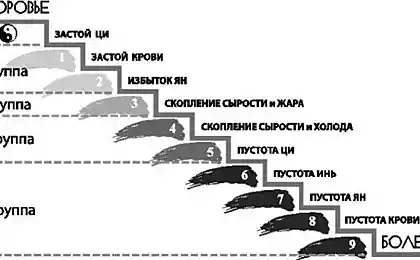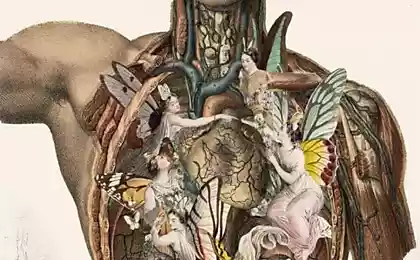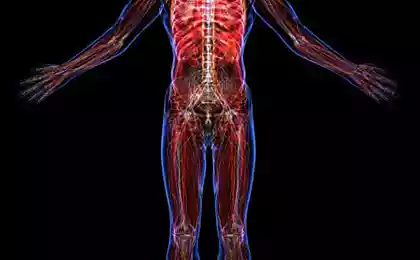1479
Body's response to extreme conditions
Acceleration
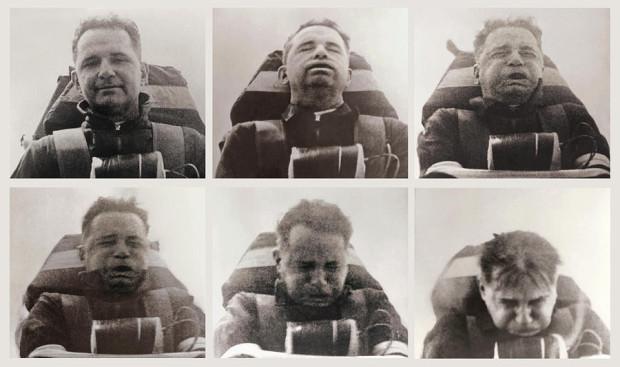
John Stapp
Overload does not affect humans until the end of World War I, when the pilots for mysterious reasons began to lose consciousness in the midst of flight. Thanks to the US Air Force officer John Stapp, we learned a lot more about how to overload effects on the human body, and began serious studies to identify the causes.
Stepp subjected yourself to 35g, which is equivalent to the acceleration of 343 m / s2. His bones are cracked and broken, and flew dental fillings. But a greater effect on blood fell.
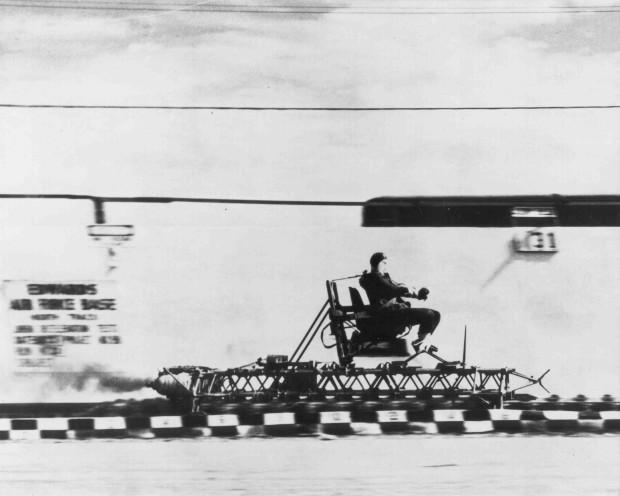
When acceleration occurs along the horizontal axis, the body can withstand overloads well enough, because the blood flow remains in the same horizontal plane. But when the acceleration of gravity acts vertically, things are not going so well. After a certain level (about 4-5g for most people), our body systems are not strong enough to pump blood, and all of it remains in our lower extremities.
Negative acceleration of gravity causes the same problems, impeding blood flow and rapidly accumulating too much blood in one place. That's why there is a G-suit: the air in the costumes creates sufficient external pressure to keep the blood where it should be, preventing the loss of consciousness pilots.
Stapp survived last run when he sped up to 1017-year-km / h, stopped at one second and briefly weighed 3500 kg. In the end, he died peacefully at his home at the age of 89 years.
Pressure
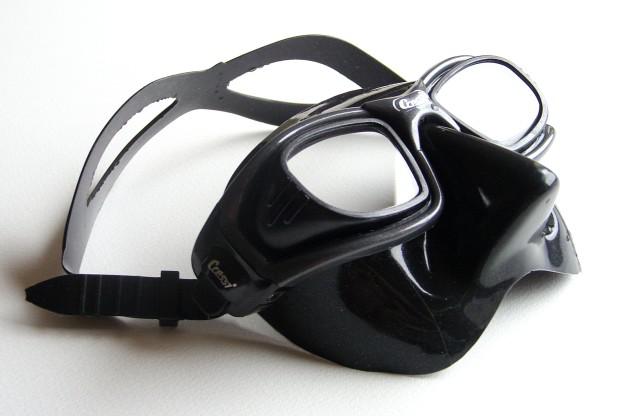
Decompression sickness, commonly known as "the bends", occurs when the human body feels a sudden drop in ambient pressure. In the blood can no longer efficiently dissolve gas such as nitrogen. Instead, the gases remain in the blood stream in the form of bubbles. In severe cases, the bubbles accumulate in the blood vessels and block the flow, which could result in dizziness, confusion and even possible death.
Mild form of "the bends", as a rule, causes joint pain and swelling of tissues. Divers who expose themselves to pressure changes regularly, can no longer ignore the effects of "the bends", which can lead to permanent damage to the joints. Decompression sickness can kill the second type. Victims of this type of test conditions such as dizziness, paralysis and shock.
Chill

When the body temperature falls to about 30 ° C, all the functions of the organism slow. The first symptoms of this are fatigue, clumsiness, and the delay in responding to external stimuli.
One of the first 30-degree mark thermoregulatory system fails, or the body's ability to maintain its own internal temperature. The heart also will gradually slow down together with the work of the lungs, while the entire body lacks oxygen. Furthermore, rapid kidney failure, flooding the body with dilute urine. This material infiltrates into the blood and organs, causing shock and other heart problems.
Decreased metabolism and requirements of the body's systems allows some people to survive the extreme cases of hypothermia and fully recover with proper warming.
Glow
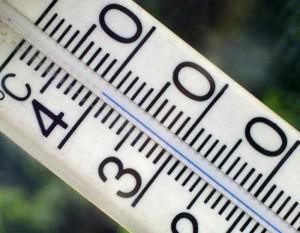
Thermal shock occurs when the core body temperature rises above 40 degrees. Classic heatstroke develops slowly under the influence of heat, for example, in the summer heat. Heat stroke during physical activity affects people who experience severe physical exertion in hot environments such as industrial workers and athletes. Only 20% of people who have experienced any of these two types, can survive without treatment, and many who survived heat stroke suffered some brain damage.
Humidity increases the chances of getting heat stroke, preventing the evaporation of sweat and lowering the body's ability to protect themselves from the heat. Once the internal temperature of the body will hold on to 42 ° C for 45 minutes, the cells begin to fail. Tissues swell digestive system weakens, letting toxins into the body. In more mild cases, called heat exhaustion, only slows the circulatory system. At full heat stroke nervous system does not function properly, which leads to confusion, cramps and dizziness.
Fire

Hot air and humidity can push the body to its limits. But the fire, not surprisingly, takes the body a few steps further - to damage, death and decay.
Researchers from the University of West Florida burned corpses donated to document what happens to the body. Normal human body is burnt for seven hours. The outer layer of skin is burned first, cracked before the fire. The deeper layers of the skin not hold much longer, disappearing after about five minutes.
By the time the flame is taken as the fat layer. Fat is a good fuel, while the clothes or the wood in the fire serve as a candle wick. Fat melting, soaking in the "wick", and then turn on for a few hours. Flame also dries the muscles, reducing them and causing the body to move.
Fire usually fades itself when only the bones remain, if they are not broken, and have not leaked brain. The teeth also do not burn.
During the cremation, however, is a much hotter fire, and the body burns faster. The temperature of the fire at the cremation reaches 600-800 ° C. But even at this temperature, the process of transformation of the body into ash can last several hours.
According to the researchers, the human body is burning smells like pork ribs on the barbecue.
Hunger

We all know that hunger kills, but the way it happens, especially appalling. Stomach physically reduced in size, after which can be uncomfortable again have a normal amount of food, even if it is food for your salvation. The heart muscle contracts, reducing the number of strokes and lowering blood pressure. Prolonged fasting leads to anemia, and women can completely stop menstruation.
When the body lacks the sugar begins to burn fat. This may seem like something good, but when the supply of oil is consumed rapidly, together with the energy released compounds called ketones. Ketones accumulate, leading to nausea and exhaustion, not to mention bad breath.
Your bones can permanently weaken after temporary starvation. Perhaps more surprising would be a permanent effect on the brain. Without the vital nutrients such as potassium and phosphorus, the brain can not function normally. You can physically lose part of the gray matter in the brain, even if you continue to have some irretrievable loss, making violations of brain functions constant.
Growing children and adolescents may suffer from a chronic illness throughout his life, such as the inability to bear a child for a woman to term. Perhaps most strange that people suffering from long-term starvation, often overgrown layer of tiny soft hairs, called lanugo, which helps the body to regulate its temperature.
Height

Even if you are not afraid of heights, you are likely to experience painful sensation when viewed from the top of a skyscraper. This vertigo, and it is not only psychological.
Equilibrium - a tricky thing. When we are on earth, we focus on fixed-resistant objects. However, when we are at the top of a 30-storey building, it does not work. The nearest immovable object (except the floor under your feet) is located so far away that your body can not use it to reassure himself that he too is stationary.
Wiggle the building creates an additional problem. When you are high enough, all lightly swinging, and our bodies feel it, even if we are not aware of. The more we are, the more rocking, and the harder we adjust our balance. If the effect is strong enough, it can affect our own center of gravity.
People bad judge distances, suffer from acrophobia stronger. In the study, University of California examines how people evaluate the height of the buildings. Those who overestimated the height of the building, showed a strong reaction, standing at a height. These results suggest a direct link between perception and fear.
Chemicals
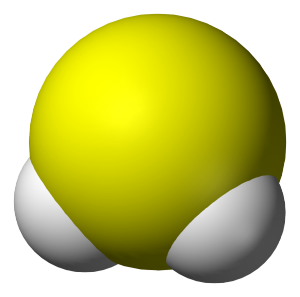
Hydrogen sulfide is a pretty nasty thing. His smell rancid eggs, and a large number may have killed the dinosaurs and countless other forms of prehistoric life. But all living things produces this substance in very small quantities, and it helps to regulate the speed of our internal processes. And most recently, hydrogen sulfide was found a new use - the introduction of a state of suspended animation in mice.
When introducing the correct dose sulfide slows metabolism in the body and decreases the internal temperature is significantly below the threshold of hypothermia. All functions of the body, including the blood circulation and lung function, virtually stopped.
Tests on animals have shown that hydrogen sulfide inhibits the normal functioning of the body, but it can make it the ideal tool for slowing the damage from burns and diseases, while a man can not receive the necessary assistance.
Radiation
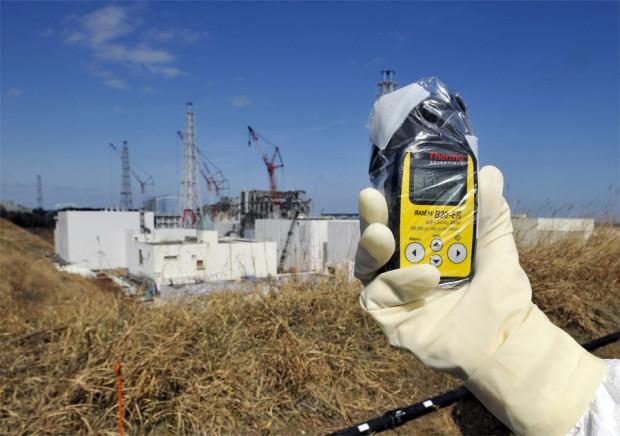
Radioactive decay releases energy in the environment. This energy interacts with the cells of the body, either by destroying them or forcing mutate. Mutations develop into cancer, and some radioactive materials affect specific parts of the body especially hard. For example, radioactive iodine accumulates in the thyroid gland, causing thyroid cancer, especially in children.
To develop significantly the risk of cancer in humans requires a relatively large amount of radiation. Usually a person is exposed to 0, 24 to 0, 3 rems of radiation per year. To the risk of cancer increased by 0, 5% must be about 10 rem.
Radiation sickness kills at 200 rem. Radiation sickness is instantaneous effects such as vomiting, reduction in the number of erythrocytes and bone marrow damage. Bone damage caused another, more serious problem: the bone marrow is responsible for producing platelets needed in the process of blood clotting.
Loneliness

The feeling of loneliness - normally. Even in a room filled we can feel an overwhelming sense of loneliness, if we anybody nothing connects. But chronic loneliness can have a real impact on our body.
According to psychologists, University of Chicago, among single people severely suppressed immune system interesting reason. Because people feel lonely world of danger, unwelcoming place, their immune system to fixate on the fight against bacterial infections. This makes them unable to produce sufficient amounts of antiviral antibodies, making them more susceptible to viral diseases.
Do single people also often have high blood pressure, as well as atherosclerosis and sleep problems. A high level of stress makes lonely people more vulnerable to heart disease and stroke.
Water

We all know about the dangers of dehydration, but not less, and we hear about the dangers of excess water in the body.
Water intoxication causes all kinds of problems, the most deadly of which is hyponatremia. When the kidneys can not get rid of excess water, they pushed her into the bloodstream, where it thins the blood and causes a serious drop in the number of electrolytes. Without enough salt in the body you suffer from headaches, exhaustion, vomiting and disorientation.
After the blood can no longer cope with this, the water is directed to cells that swell. This process is fatal when the cells are not able to grow, e.g., in the spinal cord or brain. This causes swelling of the brain, coma, convulsions and, ultimately, death.
Also, excessive drinking can be another problem. The water contains contaminants. If you regularly drink more water than the recommended safe amount (which is actually much smaller than lauded eight glasses a day), contaminants can quickly reach a level at which the body can no longer cope with the situation.
©

John Stapp
Overload does not affect humans until the end of World War I, when the pilots for mysterious reasons began to lose consciousness in the midst of flight. Thanks to the US Air Force officer John Stapp, we learned a lot more about how to overload effects on the human body, and began serious studies to identify the causes.
Stepp subjected yourself to 35g, which is equivalent to the acceleration of 343 m / s2. His bones are cracked and broken, and flew dental fillings. But a greater effect on blood fell.

When acceleration occurs along the horizontal axis, the body can withstand overloads well enough, because the blood flow remains in the same horizontal plane. But when the acceleration of gravity acts vertically, things are not going so well. After a certain level (about 4-5g for most people), our body systems are not strong enough to pump blood, and all of it remains in our lower extremities.
Negative acceleration of gravity causes the same problems, impeding blood flow and rapidly accumulating too much blood in one place. That's why there is a G-suit: the air in the costumes creates sufficient external pressure to keep the blood where it should be, preventing the loss of consciousness pilots.
Stapp survived last run when he sped up to 1017-year-km / h, stopped at one second and briefly weighed 3500 kg. In the end, he died peacefully at his home at the age of 89 years.
Pressure

Decompression sickness, commonly known as "the bends", occurs when the human body feels a sudden drop in ambient pressure. In the blood can no longer efficiently dissolve gas such as nitrogen. Instead, the gases remain in the blood stream in the form of bubbles. In severe cases, the bubbles accumulate in the blood vessels and block the flow, which could result in dizziness, confusion and even possible death.
Mild form of "the bends", as a rule, causes joint pain and swelling of tissues. Divers who expose themselves to pressure changes regularly, can no longer ignore the effects of "the bends", which can lead to permanent damage to the joints. Decompression sickness can kill the second type. Victims of this type of test conditions such as dizziness, paralysis and shock.
Chill

When the body temperature falls to about 30 ° C, all the functions of the organism slow. The first symptoms of this are fatigue, clumsiness, and the delay in responding to external stimuli.
One of the first 30-degree mark thermoregulatory system fails, or the body's ability to maintain its own internal temperature. The heart also will gradually slow down together with the work of the lungs, while the entire body lacks oxygen. Furthermore, rapid kidney failure, flooding the body with dilute urine. This material infiltrates into the blood and organs, causing shock and other heart problems.
Decreased metabolism and requirements of the body's systems allows some people to survive the extreme cases of hypothermia and fully recover with proper warming.
Glow

Thermal shock occurs when the core body temperature rises above 40 degrees. Classic heatstroke develops slowly under the influence of heat, for example, in the summer heat. Heat stroke during physical activity affects people who experience severe physical exertion in hot environments such as industrial workers and athletes. Only 20% of people who have experienced any of these two types, can survive without treatment, and many who survived heat stroke suffered some brain damage.
Humidity increases the chances of getting heat stroke, preventing the evaporation of sweat and lowering the body's ability to protect themselves from the heat. Once the internal temperature of the body will hold on to 42 ° C for 45 minutes, the cells begin to fail. Tissues swell digestive system weakens, letting toxins into the body. In more mild cases, called heat exhaustion, only slows the circulatory system. At full heat stroke nervous system does not function properly, which leads to confusion, cramps and dizziness.
Fire

Hot air and humidity can push the body to its limits. But the fire, not surprisingly, takes the body a few steps further - to damage, death and decay.
Researchers from the University of West Florida burned corpses donated to document what happens to the body. Normal human body is burnt for seven hours. The outer layer of skin is burned first, cracked before the fire. The deeper layers of the skin not hold much longer, disappearing after about five minutes.
By the time the flame is taken as the fat layer. Fat is a good fuel, while the clothes or the wood in the fire serve as a candle wick. Fat melting, soaking in the "wick", and then turn on for a few hours. Flame also dries the muscles, reducing them and causing the body to move.
Fire usually fades itself when only the bones remain, if they are not broken, and have not leaked brain. The teeth also do not burn.
During the cremation, however, is a much hotter fire, and the body burns faster. The temperature of the fire at the cremation reaches 600-800 ° C. But even at this temperature, the process of transformation of the body into ash can last several hours.
According to the researchers, the human body is burning smells like pork ribs on the barbecue.
Hunger

We all know that hunger kills, but the way it happens, especially appalling. Stomach physically reduced in size, after which can be uncomfortable again have a normal amount of food, even if it is food for your salvation. The heart muscle contracts, reducing the number of strokes and lowering blood pressure. Prolonged fasting leads to anemia, and women can completely stop menstruation.
When the body lacks the sugar begins to burn fat. This may seem like something good, but when the supply of oil is consumed rapidly, together with the energy released compounds called ketones. Ketones accumulate, leading to nausea and exhaustion, not to mention bad breath.
Your bones can permanently weaken after temporary starvation. Perhaps more surprising would be a permanent effect on the brain. Without the vital nutrients such as potassium and phosphorus, the brain can not function normally. You can physically lose part of the gray matter in the brain, even if you continue to have some irretrievable loss, making violations of brain functions constant.
Growing children and adolescents may suffer from a chronic illness throughout his life, such as the inability to bear a child for a woman to term. Perhaps most strange that people suffering from long-term starvation, often overgrown layer of tiny soft hairs, called lanugo, which helps the body to regulate its temperature.
Height

Even if you are not afraid of heights, you are likely to experience painful sensation when viewed from the top of a skyscraper. This vertigo, and it is not only psychological.
Equilibrium - a tricky thing. When we are on earth, we focus on fixed-resistant objects. However, when we are at the top of a 30-storey building, it does not work. The nearest immovable object (except the floor under your feet) is located so far away that your body can not use it to reassure himself that he too is stationary.
Wiggle the building creates an additional problem. When you are high enough, all lightly swinging, and our bodies feel it, even if we are not aware of. The more we are, the more rocking, and the harder we adjust our balance. If the effect is strong enough, it can affect our own center of gravity.
People bad judge distances, suffer from acrophobia stronger. In the study, University of California examines how people evaluate the height of the buildings. Those who overestimated the height of the building, showed a strong reaction, standing at a height. These results suggest a direct link between perception and fear.
Chemicals

Hydrogen sulfide is a pretty nasty thing. His smell rancid eggs, and a large number may have killed the dinosaurs and countless other forms of prehistoric life. But all living things produces this substance in very small quantities, and it helps to regulate the speed of our internal processes. And most recently, hydrogen sulfide was found a new use - the introduction of a state of suspended animation in mice.
When introducing the correct dose sulfide slows metabolism in the body and decreases the internal temperature is significantly below the threshold of hypothermia. All functions of the body, including the blood circulation and lung function, virtually stopped.
Tests on animals have shown that hydrogen sulfide inhibits the normal functioning of the body, but it can make it the ideal tool for slowing the damage from burns and diseases, while a man can not receive the necessary assistance.
Radiation

Radioactive decay releases energy in the environment. This energy interacts with the cells of the body, either by destroying them or forcing mutate. Mutations develop into cancer, and some radioactive materials affect specific parts of the body especially hard. For example, radioactive iodine accumulates in the thyroid gland, causing thyroid cancer, especially in children.
To develop significantly the risk of cancer in humans requires a relatively large amount of radiation. Usually a person is exposed to 0, 24 to 0, 3 rems of radiation per year. To the risk of cancer increased by 0, 5% must be about 10 rem.
Radiation sickness kills at 200 rem. Radiation sickness is instantaneous effects such as vomiting, reduction in the number of erythrocytes and bone marrow damage. Bone damage caused another, more serious problem: the bone marrow is responsible for producing platelets needed in the process of blood clotting.
Loneliness

The feeling of loneliness - normally. Even in a room filled we can feel an overwhelming sense of loneliness, if we anybody nothing connects. But chronic loneliness can have a real impact on our body.
According to psychologists, University of Chicago, among single people severely suppressed immune system interesting reason. Because people feel lonely world of danger, unwelcoming place, their immune system to fixate on the fight against bacterial infections. This makes them unable to produce sufficient amounts of antiviral antibodies, making them more susceptible to viral diseases.
Do single people also often have high blood pressure, as well as atherosclerosis and sleep problems. A high level of stress makes lonely people more vulnerable to heart disease and stroke.
Water

We all know about the dangers of dehydration, but not less, and we hear about the dangers of excess water in the body.
Water intoxication causes all kinds of problems, the most deadly of which is hyponatremia. When the kidneys can not get rid of excess water, they pushed her into the bloodstream, where it thins the blood and causes a serious drop in the number of electrolytes. Without enough salt in the body you suffer from headaches, exhaustion, vomiting and disorientation.
After the blood can no longer cope with this, the water is directed to cells that swell. This process is fatal when the cells are not able to grow, e.g., in the spinal cord or brain. This causes swelling of the brain, coma, convulsions and, ultimately, death.
Also, excessive drinking can be another problem. The water contains contaminants. If you regularly drink more water than the recommended safe amount (which is actually much smaller than lauded eight glasses a day), contaminants can quickly reach a level at which the body can no longer cope with the situation.
©








